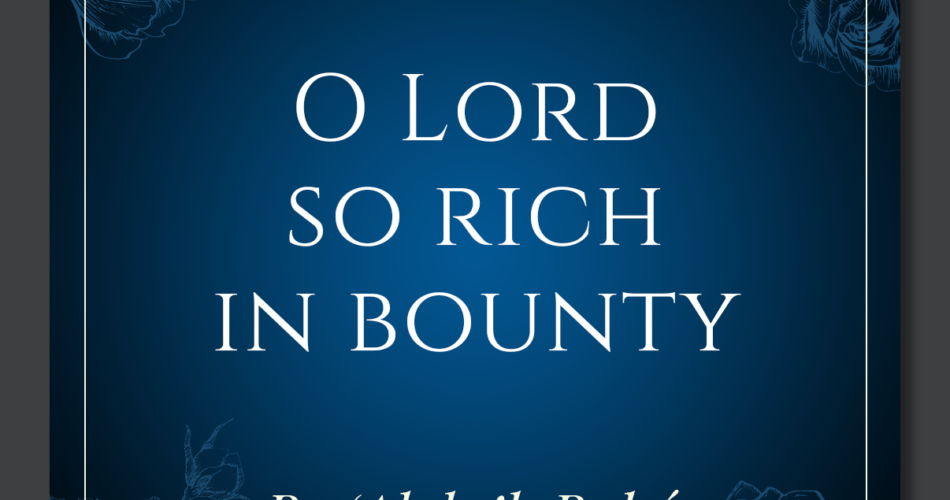O Lord so rich in bounty, so replete with grace,
Whose knowledge doth mine inmost heart and soul embrace!At morn, the solace of my soul is none but Thee;
The knower of my loss and woe is none but Thee.The heart that for a moment hath Thy mention known
Will seek no friend save longing pain for Thee alone.Withered be the heart that sigheth not for Thee,
And better blind the eye that crieth not for Thee!In all mine hours of deepest gloom, O Lord of might,
My heart hath Thy remembrance for a shining light.Do, through Thy favour, breathe Thy spirit into me,
That what hath never been may thus forever be.Consider not our merit and our worth,
O Lord of bounty, but the grace Thou pourest forth.Upon these broken-winged birds whose flight is slow
‘Abdu’l-Bahá
Out of Thy tender mercy newfound wings bestow.
ای خدای پرعطای ذو المنن
واقف جان و دل و اسرار مندر سحرها مونس جانم توئی
مطّلع بر سوز و حرمانم توئیهر دلی پیوست با ذکرت دمی
جز غم تو مینجوید محرمیخون شود آن دل که بریان تو نیست
کور به چشمی که گریان تو نیستدر شبان تیره و تار ای قدیر
یاد تو در دل چو مصباح منیراز عنایاتت بدل روحی بدم
تا عدم گردد ز لطف تو قدمدر لیاقت منگر و در قدرها
بنگر اندر فضل خود ای ذو العطاءاین طیور بال و پر اشکسته را
حضرت عبدالبهاء
از کرم بال و پری احسان نما
The Rashḥ-i-‘Amá (The Clouds of the Realms Above) was part one in a two-part series of very early Writings of Bahá’u’lláh and ‘Abdu’l-Bahá in the form of Persian poems.
Today, we are thrilled to present you with the second part in this series, “O Lord so rich in bounty,” another poem (this one by ‘Abdu’l-Bahá) with an authorized translation into English. To be more precise, it is a short prayer originally written in the form of rhyming couplets, and it is actually the conclusion to ‘Abdu’l-Bahá’s extensive commentary on the Islamic hadith “I was a hidden treasure,” which He wrote as a young man and is perhaps the first major work we have from Him.
The authorized English translation uses the same rhyme scheme as the original Persian (AABB) and is set mostly to iambic hexameter, with the exceptions of one shift to trochaic hexameter (in the first line of the fourth verse) and another to iambic pentameter (in the first line of the penultimate verse).
Original Sources
Further References
